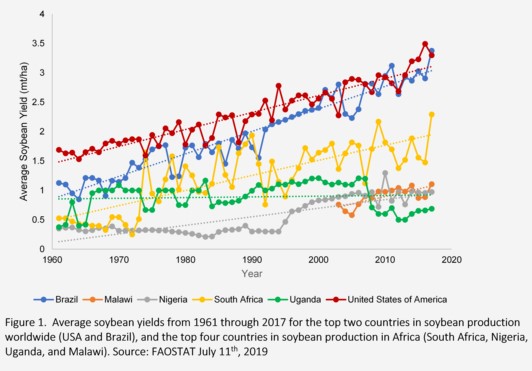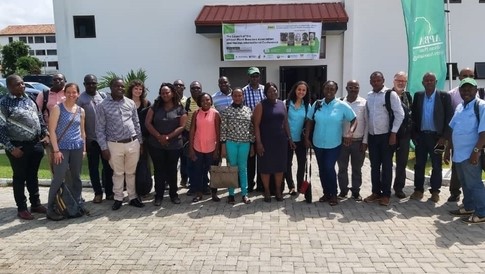The global soybean revolution is under way, and the development community recognizes the potential for soybean technologies to raise incomes and reduce malnutrition. Soybean has been the fastest growing crop for the last 20 years as farmers attempt to meet the rising demand for a variety of feed, food, and industrial products. However, agricultural productivity in Africa has lagged behind most of the world. Despite soybeans having a long history in Africa, soybean yields have increased very little over the last half century, especially when compared to the U.S. and Brazil (see Figure 1). Low yields mean poor profitability for farmers which has significantly affected soybean production across Sub-Saharan Africa. Low yields are a result of various factors including poor agronomic practices, infertile soils and a lack of improved, more adaptable varieties.

The USAID Feed the Future Soybean Innovation Lab’s (SIL) technical team of 40 U.S. researchers working in 17 countries across Sub-Saharan Africa provides direct support, training, and evidence-based guidance to establish a strong foundation for soybean development. SIL partners with public and private African breeding programs to address unique challenges in developing high yielding varieties, such as adaptation to low-latitude tropical environments. Because of the daylength sensitivity of soybean, the short-day length in these latitudes results in soybean adapted to higher latitude temperate regions to flower and mature too early to yield well. In addition to latitude, breeders must consider variation in the elevation of production environments in Africa as cooler temperatures at higher elevations will slow maturity compared to low elevation environments. African breeding programs have also focused their efforts on breeding for resistance to diseases such as Asian soybean rust.
The lack of distribution and adoption of improved soybean varieties can also be attributed to the insufficient number of plant breeders across Africa. Would-be plant breeders often chose to pursue MS- and PhD-degree programs in the U.S. or Europe, and more than half of these did not return to Africa to practice their profession once graduated (Ali et al. 2007). The University of Ghana established the West Africa Centre for Crop Improvement (WACCI) in 2007, in partnership with Cornell University, to offer quality education and training in Genetics and Plant Breeding to African students. WACCI aimed to create a sizeable, innovative workforce to increase agricultural productivity and ensure food security, especially for the people of west and central Africa. Professor Rita Hogan Mumm, SIL researcher and founding director of the Illinois Plant Breeding Center at the University of Illinois partnered with WACCI in efforts to achieve a top-notch curricula for its graduate programs. To date, more than 100 MS and PhD scientists from 14 countries have been trained at WACCI, going to work for national breeding programs, seed companies, government agencies, and NGOs in their home countries.

Figure 2. Soybean Innovation Lab breeders, scientists, and agronomists attended the launch of the first African Plant Breeders Association Conference, hosted by WACCI and the University of Ghana, in October 2019.
In order to provide smallholder farmers access to high-yielding soybean varieties that can increase and diversify their sources of on-farm income, the Soybean Innovation Lab (SIL), with partners at the Syngenta Foundation for Sustainable Agriculture (SFSA), the International Institute of Tropical Agriculture (IITA), and the African Agricultural Technology Foundation (AATF), created the Pan-African Soybean Variety Trials (PATs) program. The goal of the PATs is to fast-track the identification and commercialization of new, high-yielding soybean varieties that grow well in African environments and have enhanced overall seed quality, which should ultimately result in profitable soybean production for smallholder farmers in Africa.
Click here to see more...